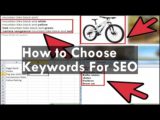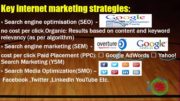If you want to find out more about Market Samurai or try it out, just click on this link –
That is an affiliate link and if you do invest in Market Samurai, you will not pay more, but I may receive a reward. Thank you.
How to Find Keywords
Introduction
I am often asked how to find keywords. But before I explain this, it is really important that you understand WHY you need to find keywords and the consequences for your content if you don’t.
When I started blogging, I thought it was going to be really cool! Lots of content would mean lots of readers and traffic. This would lead to lots of new leads and then some of these great people would want to buy stuff from me.
So, I started creating content like a demon – and what happened? Crickets! Nothing! Nada!
It took me a long time to work out that the main reason for this was that I was not targeting keywords so that my potential audience were not able to find my content in the first place.
I am going to explain why Keyword Research is so important and show you how you can do your own keyword research with:
• Google (free) –
• Google Keyword Planner (free) –
• Keyword.io (free plan – you don’t need the paid plan)
• Market Samurai (paid) –
So, Are you completely wasting your time?
• Are you completely wasting your time when you blog?
• What are you writing about?
• Does anyone care? Is anyone interested?
• How do you know or rather how can you find out?
The answer is keyword research – and this does not have to cost you anything.
Let me emphasise, if this is NOT part of your blogging process, you are definitely wasting time, leaving money on the table and missing a trick.
So what am I talking about?
When you write a blog post or an article, you need to tie your topic into a keyword.
To be clear, decide what you are going to write about – make sure that there is some benefit for your audience and then do your keyword research – not the other way around.
You need to identify the keyword you are going to tie into your article.
What is a keyword?
A keyword (which can be a phrase rather than a single word) is what someone types into a search engine when they are looking for content on the internet.
Short and obvious keywords are simple, relatively few in number and very competitive. Your chances of ranking, or being found in search for short simple keywords, is very low. Longer phrases, known as long tail keywords, are much more interesting and these are the keywords you need to concentrate on.
Online Markets
You need to understand online markets before you can understand why keywords are important.
There are two keys to internet marketing success:
• The market you select
• The keywords you target
Keywords are important because they are the secret answer to the key factor in internet marketing and that is intent. There are three main reasons for a search:
• Information – trying to find out about something
• Navigation – trying to find something online
• Transaction – trying to find something to purchase
This last one is the most important for internet marketers.
For each keyword, the number of people searching varies widely.
Google Page Ranking
Let me explain why ranking on the first page of Google is so important. The amount of traffic you get from organic Google search is directly related to where you appear on the front page for your keyword term
The number 1 ranked website receives 42% of clicks
The number 2 ranked website receives 12% of clicks
The number 3 ranked website receives 8% of clicks
The number 4 ranked website receives 6% of clicks
The number 5 ranked website receives 5% of clicks
The number 6 ranked website receives 4% of clicks
The number 7 ranked website receives 3% of clicks
And the remaining clicks are shared between all the other sites listed in Google.
Summary
If you are writing or publishing online, you want people to read and engage with your content.
They cannot do that if they don’t find it
To help them to find it you need to ensure that your content uses Keywords which the search engines will use to connect people looking for content to the keyword relevant content you have created.
Look at them like sign posts or directions. Without them, your audience is lost.
In part 2 I will show you how to find and use relevant keywords.













